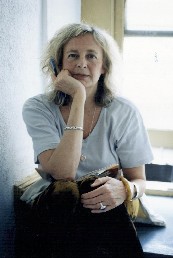Rosemary Santini’s Jane Addiction
 Rosemarie Santini is a poet, journalist, and novelist who has lectured for more than a decade at The New School. She’s been published in Playboy and other major magazines and is the author of a nonfiction book called The Secret Fire: How Women Live Their Sexual Fantasies. I mention it because her latest novel, Sex and Sensibility: The Adventures of a Jane Austen Addict offers a fictional foray into similar territory, heavy on the romance. In this essay, she thinks about why she and her character just can’t get Austen out of their heads.
Rosemarie Santini is a poet, journalist, and novelist who has lectured for more than a decade at The New School. She’s been published in Playboy and other major magazines and is the author of a nonfiction book called The Secret Fire: How Women Live Their Sexual Fantasies. I mention it because her latest novel, Sex and Sensibility: The Adventures of a Jane Austen Addict offers a fictional foray into similar territory, heavy on the romance. In this essay, she thinks about why she and her character just can’t get Austen out of their heads.
I’ve always been a Jane Austen fan. In the last decade, my creative writing classes have been populated by young Sex in the City gals who also love Jane Austen. Invariably, the contrast between our present era and Jane’s comes up in discussion, and I’m constantly surprised at the similarity in courtship rituals and romantic dilemmas.
That’s what inspired me to write Sex & Sensibility. I’ll be reading from the book at an upcoming meeting of the Jane Austen Society. The theme of the meeting is: “Is it possible to lead a Jane Austen-inspired life?”
Well, can we?
16 September 2005 | guest authors |
Susan Swan Locates Herself in the Casanova Craze
 Susan Swan is the author of the acclaimed novel The Wives of Bath, which was turned into the Sundance Festival hit Lost and Delirious with Piper Perabo as a prep school girl with a crush on her classmate that just won’t go away. Her latest, What Casanova Told Me, starts with the fictional diary of the lover he takes on one last grand adventure, then jumps headlong into the present day, as that woman’s descendant searches for the end of that story while sorting through complications of her own. In this essay for Beatrice readers, she explains what she—along with so many others—sees in the life and legend of Europe’s greatest lover.
Susan Swan is the author of the acclaimed novel The Wives of Bath, which was turned into the Sundance Festival hit Lost and Delirious with Piper Perabo as a prep school girl with a crush on her classmate that just won’t go away. Her latest, What Casanova Told Me, starts with the fictional diary of the lover he takes on one last grand adventure, then jumps headlong into the present day, as that woman’s descendant searches for the end of that story while sorting through complications of her own. In this essay for Beatrice readers, she explains what she—along with so many others—sees in the life and legend of Europe’s greatest lover.
I didn’t notice the Casanova craze until I was halfway through my own novel about the celebrated Venetian. I’d scoffed when an aging family member recommended Casanova’s 12-volume memoir, History of My Life, and said the passage describing Casanova’s escape from the prison in the Ducal Palace was the most gripping escape narrative he’d ever read.
Somewhat disdainfully, I took away the memoir and began to read. All I knew about Casanova was his reputation as the most notorious rake the world has ever known, one of those playboys your mother told you to avoid. I’d also seen Fellini’s movie, Casanova, which cemented the womanizer myth. This film doesn’t show the intellectual and literary side of Casanova, the European man of letters who had translated the Iliad, written poems and operas and essays and engaged in scientific discussions.
I read most of the 12 volumes of Casanova’s History of My Life and decided my family member had been too stinting in his praise. Casanova had written brilliantly about his escape from the Leads, the famous Venetian prison. But as far as I was concerned, History of My Life was one of the great works of Western literature. Soon I was writing my own version of Casanova’s tale, a novel about him returning as an old man to Venice for a last look at the city he loves and running off to travel in the Mediterranean with Asked For Adams, a descendant of Puritans and cousin to president John Quincy Adams.
A belief that your own book is unique shores up the creative trance writers need to work. But somewhere in the midst of writing my novel, I stuck my head above my desktop and noticed that I shared my Casanova obsession with a host of fellow authors. By last count, at least eleven other books have dealt with Casanova in recent years.
15 September 2005 | guest authors |

 Our Endless and Proper Work is my new book with Belt Publishing about starting (and sticking to) a productive writing practice.
Our Endless and Proper Work is my new book with Belt Publishing about starting (and sticking to) a productive writing practice. 
